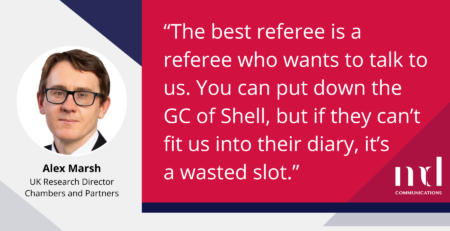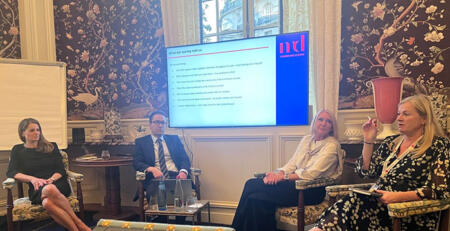MD Communications partner Keith Hardie addresses the issue of negative feedback from directory referees and how to counter this. He looks at how putting in place a client listening programme can help you to select referees more intelligently.
In my years of leading marketing communication for large law firms, one of the most difficult moments was always the day when the legal directories came out. Regardless of the effort that my teams put into the process, I would arrive to find a queue of partners lined up to complain that they were not receiving the recognition they deserved, and demanding action.
Of course, directories rankings are not an exact science and there are occasions when their evaluations may not be fair, but the truth is that it’s relatively rare to find mistakes. The teams at Chambers and Legal 500 put a lot of effort into researching the market and gaining feedback, so often what one really wants to ask the irate partners who feel victimised by the process is whether the result might actually be correct.
Despite this, my usual response was to assure the partner that I’d phone the editor personally to express our outrage and press for a correction, while lamenting that they would probably refuse to amend that year’s publication.
Some difficult partners wouldn’t accept this, and one or two would start talking about defamation and libel, so occasionally I have purchased, at great expense, the full details of feedback that the directories base their rankings on. When you see the unvarnished quotes, you invariably find that most referees have given negative comments. The good news was that a quick email sharing the report mostly silenced the partner concerned, at least for that year.
I am fairly sure that every senior legal marketer has similar tales to tell and certainly when you talk to researchers and editors on the directories, they will tell you that it is very common to get negative feedback from referees.
How do we get it so wrong?
What is staggering is that the referees concerned are given to the directories by the partners themselves as part of the process; these are the clients and contacts the partner thinks are favourable. How can partners get it so wrong?
In these circumstances, as an in-house legal marketing professional, it is easy to assume it is all the partners’ fault and allow the annual ritual to play out each time. However, I think the root cause is really a failure of the firms’ client feedback process. Too many firms still do not have effective, transparent mechanisms for monitoring client satisfaction and taking action to improve it. Partners, who aren’t used to talking to their clients openly, and clients who may not want to have tricky conversations during matters that are already stressful, aren’t likely to share dissatisfaction or learning. Law firms should have the mechanisms in place to make sure this happens.
That process is not just to enable the firm to create an academic, qualifiable measure of overall satisfaction levels. You need a process for meaningful conversations at an individual level, and one that connects it to the firm’s approach to enhancing relationships.
Introducing ‘client listening’
So, if you are amongst those who are not happy with your rankings, now is the time to think about introducing a client listening programme. My suggestion is that you might want to start by selecting a practice where rankings aren’t where you want them to be. The process should be independent, so that the clients will feel they can be honest. I suggest you use an independent team that knows the legal market, your firm and your position, so that the client isn’t having to explain that during the conversation.
If you put processes in place and make them work well, you’ll not only find that you can identify ways of delivering better service. The goal should be to get closer to key contacts and understand how they see you. That will enable you to select referees more intelligently, avoiding the surprisingly common mistake of providing contacts to the directories who give negative feedback. At the same time, you can check whether an individual is willing to provide feedback to the directories, helping to increase the number of those who respond.
The question you should ask
The question to ask yourself is whether, when the directories come to speak to your referees, you can be sure it is not the first time they have been asked about their views of your lawyers. If you can’t guarantee that your process prevents that happening, it is time to look again at client listening.
When you do, feel free to contact us at MD Communications – we are providing client listening services to a growing number of law firms, helping them not only to improve their directories rankings but also to create stronger relationships.
And surely, regardless of the directories rankings, that will have enormous benefits for lawyers, law firms, and their clients.












